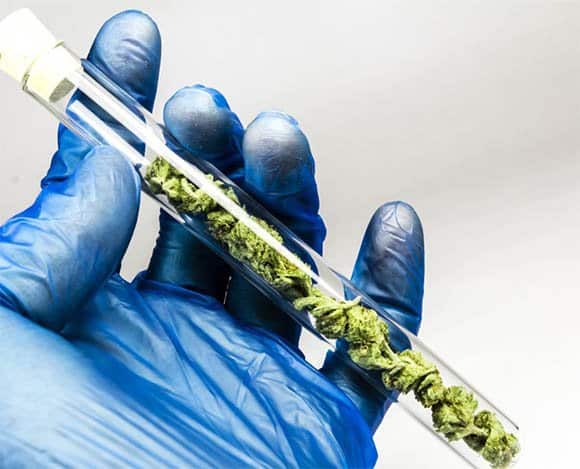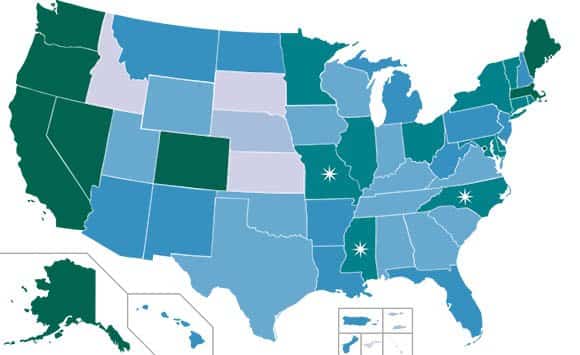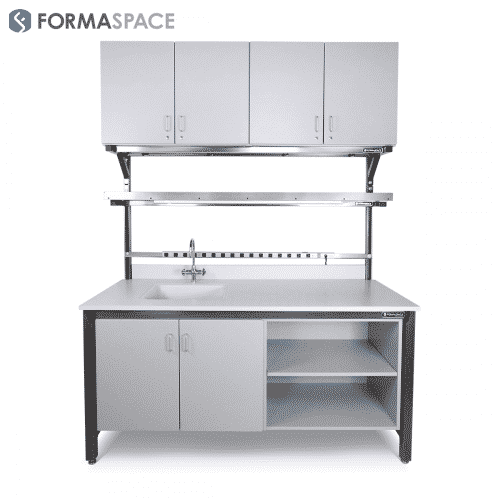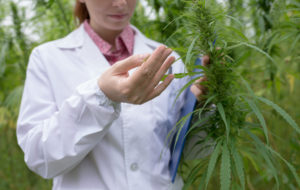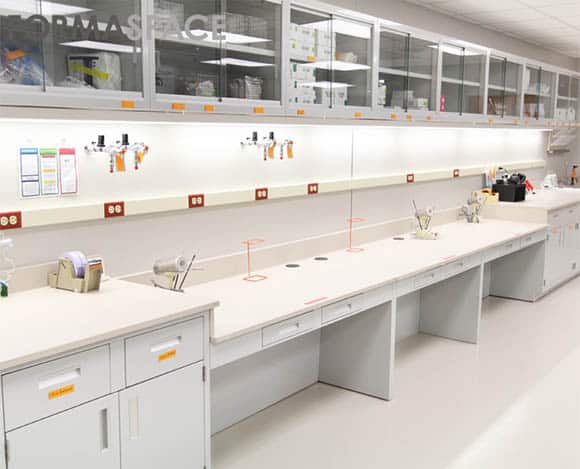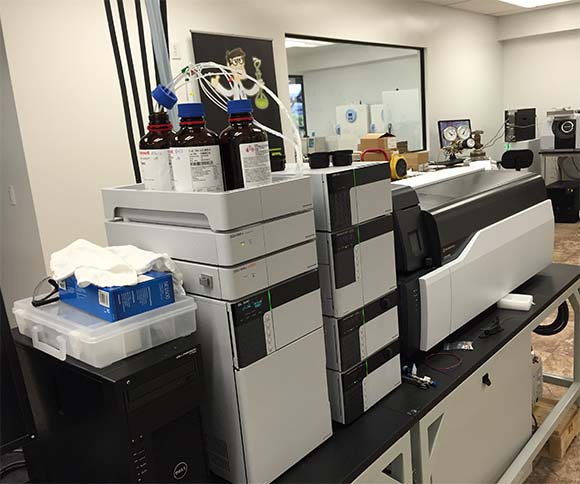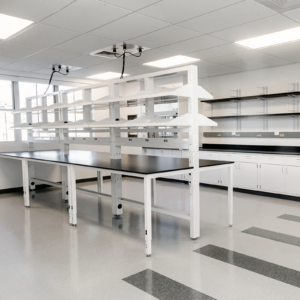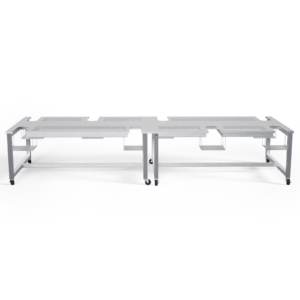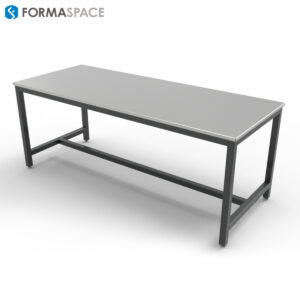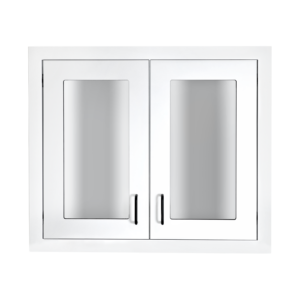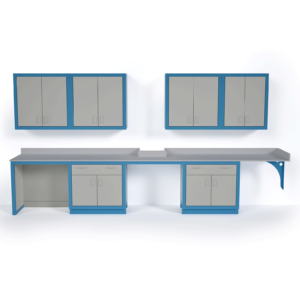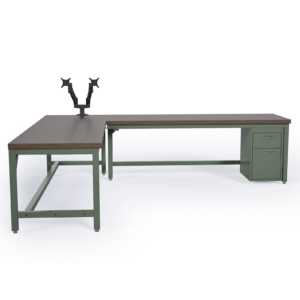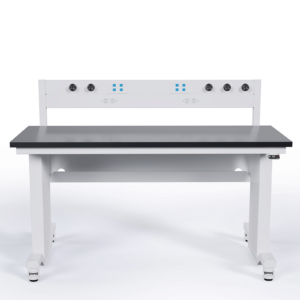As annual sales from the legal cannabis market grow to north of $1 billion dollars in Washington State alone, many existing laboratory facilities are weighing their options on whether to jump into this rapidly expanding market by offering state-regulated cannabis test and certification services.
Ballot Initiatives Allowing Recreational Cannabis Use Find Favor among Voters in the Western States and New England
California voters approved the first legal sale of cannabis for medical purposes (commonly known as medical marijuana) in 1996. This ballot initiative conferred upon doctors the ability to prescribe cannabis to patients unable to find relief using traditional medications, including those suffering from intense pain or nausea (such as cancer patients in palliative care) or those whose chronic illnesses (such as HIV/AIDS) had led to dangerous weight loss due to lack of appetite.
Since that time, the legal cannabis market has grown rapidly.
States up and down the West Coast (including Alaska) have enacted laws expanding the medical marijuana laws to permit sales of cannabis for purely recreational purposes. This is not just a West Coast phenomenon: voters in a couple of East Coast states (Maine and Massachusetts) recently approved ballot measures allowing retail sales of cannabis for recreational use in their jurisdictions as well.
Cannabis laws in the United States 1
Jurisdiction with legalized cannabis.
Jurisdiction with both medical and decriminalization laws.2
Jurisdiction with legal psychoactive medical cannabis.
Jurisdiction with legal non-psychoactive medical cannabis.
Jurisdiction with decriminalized cannabis possession laws.
Jurisdiction with cannabis prohibition.
1 Includes laws which have not yet gone into effect.
2 Marked states have only legal non-psychoactive medical cannabis.
Since we last wrote about this topic, Nevada has joined other Western states that permit recreational cannabis sales. Retail sales started July 1, 2017. Within days, available supplies were exhausted as customers emptied dispensary shelves of cannabis products. Nevada’s Republican Governor, Brian Sandoval, called for additional emergency supplies to be brought into the state to satisfy the unexpectedly high demand.
To date, here are the states which have changed their laws to allow recreational cannabis sales (in addition to medical cannabis sales), along with their respective approval and implementation dates:
- Alaska (ballot initiative approved 2014, retail sales commenced February, 2015)
- California (ballot initiative approved 2016, retail sales will commence in 2018)
- Colorado (ballot initiative approved 2012, retail sales commenced January, 2014)
- Maine (ballot initiative approved 2016, retail sales commenced within 40 days)
- Massachusetts (approved 2016, retail sales will commence in July, 2018)
- Nevada (ballot initiative approved 2016, retail sales commenced July 1, 2017)
- Oregon (ballot initiative approved 2014, retail sales commenced July 1, 2015)
- Washington (ballot initiative approved 2012, retail sales commenced over 12 months)
As Demand Grows, Tax Revenues from Legal Sales of Cannabis Products Are Helping Balance State Budgets
As the demand for the product continues to grow, there are early indications that a well-managed legal cannabis market can bring in significant tax revenue to state coffers.
Take Washington State for example. As the first state to approve both medical and recreational cannabis sales, Washington has experienced tremendous growth in cannabis sales. It’s estimated that since legalization, the cumulative sales of cannabis for recreational purposes alone have already exceeded $1 billion dollars. State officials estimate that taxes and licensing fees for cannabis sales will bring over $730 million dollars in state revenue during the current two-year budget cycle.
Oregon, which has a much smaller population (4 million versus Washington State’s 7.4 million), reportedly collected $54 million in tax revenue from cannabis sales during the first 11 months of 2016.
Colorado, which began selling recreational cannabis products in January, 2014, has benefited to the tune of more than $500 million in additional tax revenue during its first two years of legalized cannabis sales. Further driving sales growth are high-profile Coloradan businesses, which have not been shy about promoting “cannabis tourism,” e.g. attracting users from neighboring states and across the country to partake in legal pot use.
(To learn more about the effect that different tax rates can have on recreational cannabis sales, visit the Tax Foundation website for an interesting analysis.)
Do You Have the In-House Expertise Necessary to Add Cannabis Test Services to Your Existing Laboratory Offerings?
As you look at the potential of the growing cannabis market, you may be asking yourself questions such as: “What steps do I need to take to add cannabis test services to my existing laboratory program?” or “What kind of personnel do I need to hire?”
Laboratory owners and managers who are contemplating the possibility of entering the market for testing and certifying consumer cannabis products will want to develop a business plan that evaluates the pluses and minuses in this rapidly evolving marketplace.
A major consideration is domain expertise. If your existing laboratory facility already handles food and beverage testing, or pharmaceutical manufacturing, or product toxicity tests in general, you’re more likely to already have the requisite laboratory experts and quality assurance technicians with the appropriate skill sets necessary to pursue opportunities in the new cannabis testing marketplace.
If, on the other hand, you are starting from scratch (by building a purpose-built laboratory) in order to enter the cannabis test and certification business, it’s most likely you’ll need to acquire personnel who have experience in establishing and maintaining Good Laboratory Practice (GLP) and Good Manufacturing Practice (GMP) systems — the specifics of which will be subject to the requirements set forth by the individual state markets in which you want to enter.
Certification Rules Regulating Cannabis Testing Labs Vary State by State
One of the major disadvantages of cannabis sales being regulated by the states (rather than by the Feds) is that the rules for cannabis product testing tend to vary quite a bit from state to state.
This lack of unified Federal standards for product testing and certification is a potential disadvantage for testing laboratories, which will need to adhere to widely disparate state standards and certification procedures in order to take part in the burgeoning cannabis retail marketplace.
Another concern: it’s still early days. Things are guaranteed to change.
Just as many states are only now beginning to adopt and adapt their tax rates for legal cannabis sales, many state legislators and civil service bureaucrats are still tinkering with the regulatory regimes that cover cannabis product safety and quality guidelines (including specific product testing protocols) designed to protect consumers.
What’s the Typical Scope of Product Test Services Provided by Cannabis Testing Labs?
If you need guidance on where to start researching your state’s testing requirements, turn to the website Leafly, which maintains an up-to-date, state-by-state guide to all the applicable laboratory certification requirements as well as mandated cannabis test procedures.
To give you some idea of the typical testing protocols, we’ve created a list shown below that includes representative requirements shared in common by many of the states — but be aware each state is different, and their laws and regulations are subject to change over time.
Typical Cannabis and Cannabis-based Product Certification Requirements
- Assess the chemical and microbiological composition of medical cannabis (including TCH test and CBD test to assess marijuana potency). Verify cannabinoid profiles match the product labeling.
- Test for impurities, moisture content, foreign material contamination, heavy metals, pesticide residues, plant growth regulators, microbiological contaminants, mycotoxins, terpenes, and residual solvents.
- Adhere to OECD Principles of Good Laboratory Practice and Compliance Monitoring or other relevant ISO standards; maintain internal standard operating procedures (SOPs); implement approved quality control/quality assurance (QC/QA) programs.
- Provide guidelines for certifying organic products.
Typical Grower Facility (Cultivator) Certification Requirements
- Test cultivator’s water supply for contamination.
- Test cultivator’s soil for contamination.
- Perform unannounced testing of the product as well as soil and plant samples.
Overview of Lab Equipment Needed to Perform Common Cannabis Test Services, Including Certifying Product Potency (THC Test)
If you already own or manage a testing laboratory performing pharmaceutical or food-grade testing procedures, you may be able to take on new contracts in the cannabis test and certification markets without having to make expensive investments in new lab equipment.
On the other hand, if you are creating a new laboratory from scratch, you’ll need to come up to speed quickly on the requisite equipment needed to perform specific tasks, such as THC tests for cannabis potency.
Here are three of the key cannabis test procedures and the corresponding lab equipment required to perform these tests in your laboratory:
Test 1. Cannabinoid Potency: High Pressure Liquid Chromatography (HPLC)
High Pressure Liquid Chromatography (HPLC) is the preferred approach for testing cannabis potency (THC test, CBD test, etc.). This is because the HPLC process works at room temperature. This is in contrast to other methods, such as Gas Chromatography (GC), which require adding significant heat to test samples (which can cause them to deteriorate before they can be measured accurately).
Test 2. Pesticide Contamination: Mass Spectrometer (MS)
Unlike tests for cannabinoid potency done at room temperature, tests for unwanted pesticide contamination are performed at a high temperature using a Mass Spectrometer (MS) – or a Gas Chromatography system with a built-in Mass Spectrometer.
Test 3. Identify Strains as well as Presence of Mold, Fungus, Bacteria, and Terpenes: Real-Time Polymerase Chain Reaction (PCR)
More and more regulators and consumers want to know the exact strain of cannabis product offered for sale, and whether it matches the information provided by the cultivator. Using real-time polymerase chain reaction (PCR) testing, cannabis test laboratories can identify individual cannabis strains as well as quantify levels of unwanted mold, fungus, bacteria, terpenes, and yeast found in each sample.
Don’t Overlook the Benefits of Creating a Dedicated, Efficient Workspace for Performing State-Regulated Cannabis Testing Services
As the cannabis market grows and the need for laboratory testing increases, maintaining an organized and hygienic laboratory will be a key indicator of a successful, profitable operation.
Given the sensitivities surrounding the cannabis marketplace, there will likely be increased scrutiny on all aspects of the business for years to come.
Consequently, it will be in the best interests of each and every cannabis test laboratory to maintain scrupulously clean, well-organized facilities – particularly due to the likelihood of heightened inspections and scrutiny by state regulators.
This is where Formaspace, with our long-standing expertise in creating highly efficient, organized laboratory workspaces can help.
Did you know Formaspace is already helping laboratories create or modify their facilities in order to become certified for cannabis testing?
It’s true. In fact, our first cannabis test lab customer opened for business in Nevada.
Check out our full line of laboratory benches designed for sample processing as well as our full line of heavy-duty instrumentation workstations built to take care of your heavy (and expensive) High Pressure Liquid Chromatography and Mass Spectrometry equipment.
You’ll work smarter and more comfortably with Formaspace laboratory furniture because it’s designed to provide you with optimal ergonomic comfort – thanks to our power-on-demand, height-adjustable work surfaces that let you select a working height that fits your body type at the touch of a button. And our furniture is also designed to last: it’s backed by a full 12-year, no-questions-asked guarantee.
Not only can we provide custom built furniture created by our craftsmen here in our factory headquarters in Austin Texas, we can also provide you with consulting services to help you design your laboratory facility so that you achieve efficiency by creating a place to work that is attractive, efficient, and – most importantly – profitable for your bottom line.
To learn more, contact us today by filling out the quick form below. Our Formaspace Design Consultants are ready to help you today.

